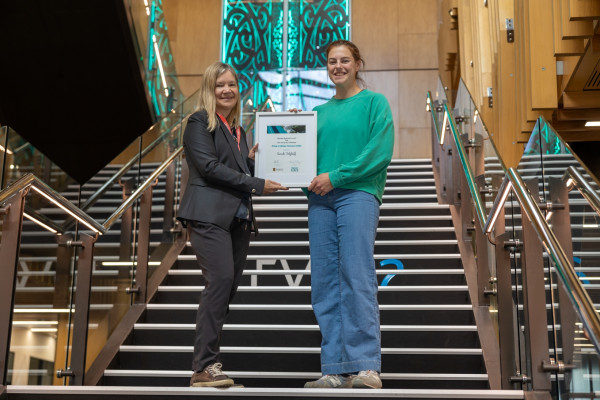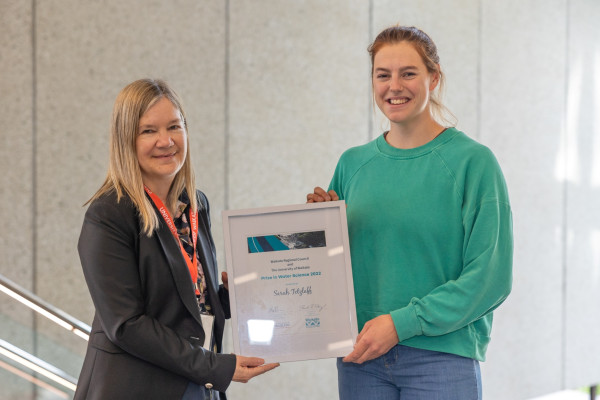Sport climbing champion wins water science prize
| Published: | 21/11/2023 |
New Zealand sport climbing champion Sarah Tetzlaff has won the Waikato Regional Council Prize in Water Science for 2023. The prize recognises a University of Waikato student who shows outstanding ability in water science papers taught in the Faculty of Science and Engineering.
Sarah combines full-time study with over 20 hours per week training in her quest to qualify for the Paris 2024 and Los Angeles 2028 Olympic Games, which means she often flies overseas to compete at international climbing events. In fact, she has recently returned from Bern, Switzerland where she competed in New Zealand’s first world championship climbing team. She broke her own New Zealand open female record of 9.29 seconds by completing a climb in 8.98 seconds.
Despite her busy training schedule, Sarah applies her passion for water science to tertiary study and has recently completed a Bachelor of Science degree majoring in environmental science. Now back home, she turns her focus to the Master of Science (Research) degree she began in July at the University of Waikato. Sarah lives and trains in Tauranga and travels to Hamilton around once a month to work on her degree.
Majoring in environmental sciences, Sarah’s master’s researches the link between shallow groundwater and algae growth in the near-shore shallow water zone (<1m depth) along Lake Tarawera. She is investigating whether this groundwater influences algae growth and also quantifying the general level of energy production in this near-shore zone, which Sarah says has never been done before in New Zealand. This knowledge may help us understand the energy production at the bottom of the food web (all the connected food chains) in lakes.
Sarah says her academic interest in water emerged from studying papers about Antarctica and water processes in rivers and glaciers: “I found these papers extremely fascinating. They really opened my eyes to how amazing water is and its importance in the climate, oceanic and terrestrial systems. Since then, I have taken all the available water science papers at Waikato University.”
Waikato Regional Council Chair Pamela Storey says she loves seeing students taking an active interest in environmental challenges: “We face some very complex problems, and organisations like ours need the best and brightest minds to find ways to solve them. We absolutely encourage people who care about water and the environment to build their knowledge and skills and help us all tackle this critical work.”
Sarah says the prize will help her buy textbooks that she would otherwise avoid paying for by reading online, which is less than ideal: “This will certainly be very helpful for my master’s research.” After that, she is open to doctoral study, consulting, or working for a crown research institute: “I am very interested in climate change and conservation work, with hydrology being a large focus, so I hope to take opportunities that steer my career in this direction.”

Associate Professor of Marine Science and Aquaculture Joanne Ellis (left) presents Sarah with her award

Joanne Ellis (left) and Sarah Tetzlaff


To ask for help or report a problem, contact us
Tell us how we can improve the information on this page. (optional)